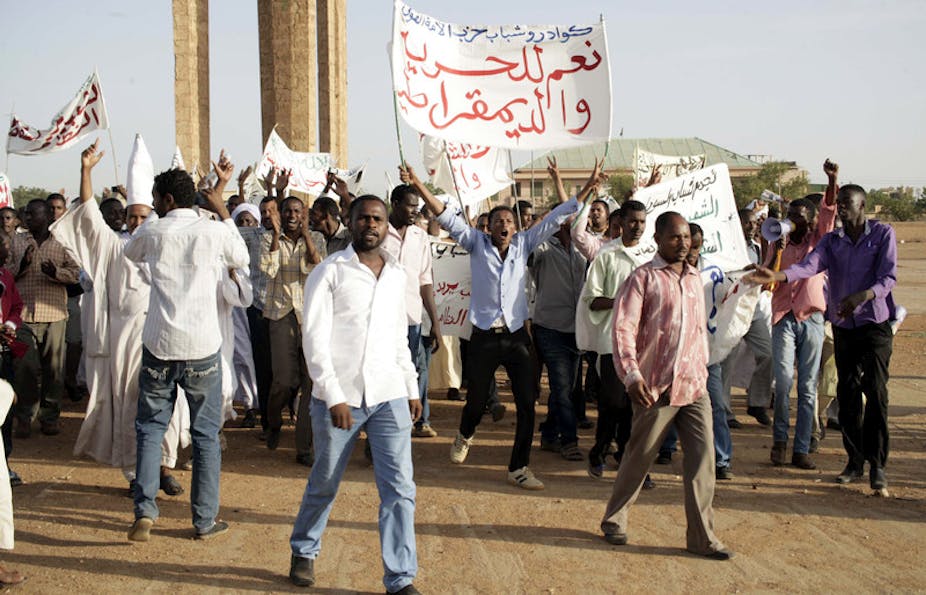The case of Meriam Ibrahim, a pregnant woman sentenced to death for apostasy by a Khartoum court, has rightly refocused international attention on the dire state of human rights in Sudan.
Ibrahim’s prosecution and sentencing for converting from Islam to Christianity (a charge she denies) violates not only the country’s international treaty obligations but also its own constitution, which explicitly upholds the right to freedom of religion.
Sudan’s government has yet to comment, aside from pointing out that the verdict is “not final” and that any overturning of it by a higher court would be in the “hands of the judiciary”, a rare nod to due process and the separation of powers by one of Africa’s most authoritarian regimes.
This sad episode highlights the Sudanese authorities’ systematic disregard for human life and dignity. Sudan is one of the poorest countries in the world, ranked 171 out of 187 states on the UN’s human development index, and yet since the 1980s, its government has diverted many of its resources on prosecuting internal wars.
Sudan has also been consistently awarded the lowest possible ratings for political rights and civil liberties by Freedom House in recent years, and its public sector is ranked among the four most corrupt in the world by Transparency International.
Omar al-Bashir, Sudan’s leader since 1989, remains the only serving head of state to have been indicted for war crimes and crimes against humanity by the International Criminal Court. He is still wanted for genocide and crimes against humanity, in the form of deportations and attempted exterminations in Sudan’s Darfur region. Many of his citizens have called for his resignation in years of protests across the country, but an Arab Spring-style regime overthrow has so far failed to materialise.
But despite these clearly dire problems, Sudan’s treatment at the hands of the West has been decidedly ambivalent – and international reactions to the Ibrahim case should flag up important contradictions in the ways western states and media outlets approach regimes such as al-Bashir’s.
Two-faced diplomacy
While the sentencing of Ibrahim (who is married to a US citizen) has attracted substantial attention across the western world, the killing of more than 200 protesters (Amnesty International’s estimate) by security forces in Khartoum alone last October was barely mentioned in many of the same publications. Likewise, where the US, UK, EU and others have rightly condemned Ibrahim’s treatment, the same regimes were far more equivocal in their responses to the al-treatment of protesters in 2013.
Indeed, in its short statement on the protests, the EU condemned the actions of both Khartoum and the protesters, insisting that “all parties … exercise maximum restraint”.
The Sudanese people have not been the only ones in East Africa to get this Janus-faced treatment from the West. Uganda’s notorious anti-homosexuality bill (now act) has (quite rightly) incurred widespread condemnation from Western leaders and prompted numerous headlines and editorials. Yet the Ugandan security forces’ brutal crackdown on anti-government protests in the country in April 2011 – when they fired randomly into crowds and killed, among others, a young child – was scarcely reported in most western media publications.
Western governments also responded with far more ambivalence than they afforded the homosexuality bill. Henry Bellingham, Britain’s then-minister for Africa, gently chided Ugandan president Yoweri Museveni for the overreaction, noting that the shootings “demean him” and that “he should now be magnanimous, he should be statesman-like”.
To some extent, these inconsistencies are a product of the messy relationships between domestic and foreign policy messaging; they also reflect the difference between highlighting injustice and oppression through journalism and simply selling newspapers. An ungenerous commentator might also draw attention to the irresponsibility and populism of many western countries’ approaches to Africa.
A more sympathetic observer might instead emphasise the strategic importance of choosing one’s battles in the foreign policy sphere, and using influence and high-profile interventions sparingly but effectively.
Few cards to play
Sudan presents a particular diplomatic quandary for the West. While many quasi-authoritarian leaders in the region (including Uganda’s Museveni) rely heavily on Western aid and assistance to bolster their budgets and arm their militaries, Sudan is not one of them. Western leverage over the al-Bashir regime is limited; it has long been an international pariah, and has learned to survive on oil rents and Chinese largesse instead of western backing.
The flux in Washington’s approach to al-Bashir since 1989 – ostracism under Bill Clinton, cautious engagement under George W. Bush, mixed messages under Barack Obama – stands testament to the difficulty the US has faced its influence to bear effectively in Khartoum.
The truth is that western governments have few cards to play in Sudan. This has been even more so since the election of fellow ICC indictee Uhuru Kenyatta to the presidency in Kenya and the outbreak of civil war in South Sudan in 2013, two events which have strengthened al-Bashir’s hand regionally and internationally. Threats and condemnations from the West will sadly do little to change Ibrahim’s fate.
But western officials have other diplomatic tools at their disposal, notably flattery and face-time. Even the tyrants of North Korea have been known to offer clemency to prisoners when personally lobbied by former US presidents. Indeed, in 2007, al-Bashir himself pardoned a British schoolteacher imprisoned for blasphemy (naming her class’s teddy bear “Muhammad”) after a visit from British legislators.
Instead of lobbying John Kerry to grant Meriam Ibrahim asylum, the two US senators from New Hampshire – home state of Ibrahim’s husband – might be better off catching the next flight to Khartoum.

